
Malaysia GE15 social chatter: Which political parties and brands are trending?
share on
Malaysia will go to the polls on 19 November 2022 and political parties are expected to ramp up election advertising until then. Facebook has generally been the main platform that Malaysians aged 35 to 44 get their news from about politics or election-related matters, a study by Milieu Insight's survey of 500 Malaysians between 18 to 21 October 2022 found.
Meanwhile, Instagram was popular among those aged 18 to 24 years old (49%) and 25 to 34 years old (49%). TikTok was also another platform that a significant portion of Gen Z (43%) turn to for political or election matters. Meanwhile, those aged 45 to 54 mainly rely on radio (55%), online news websites (53%), and printed newspapers (34%), Milieu Insight said.
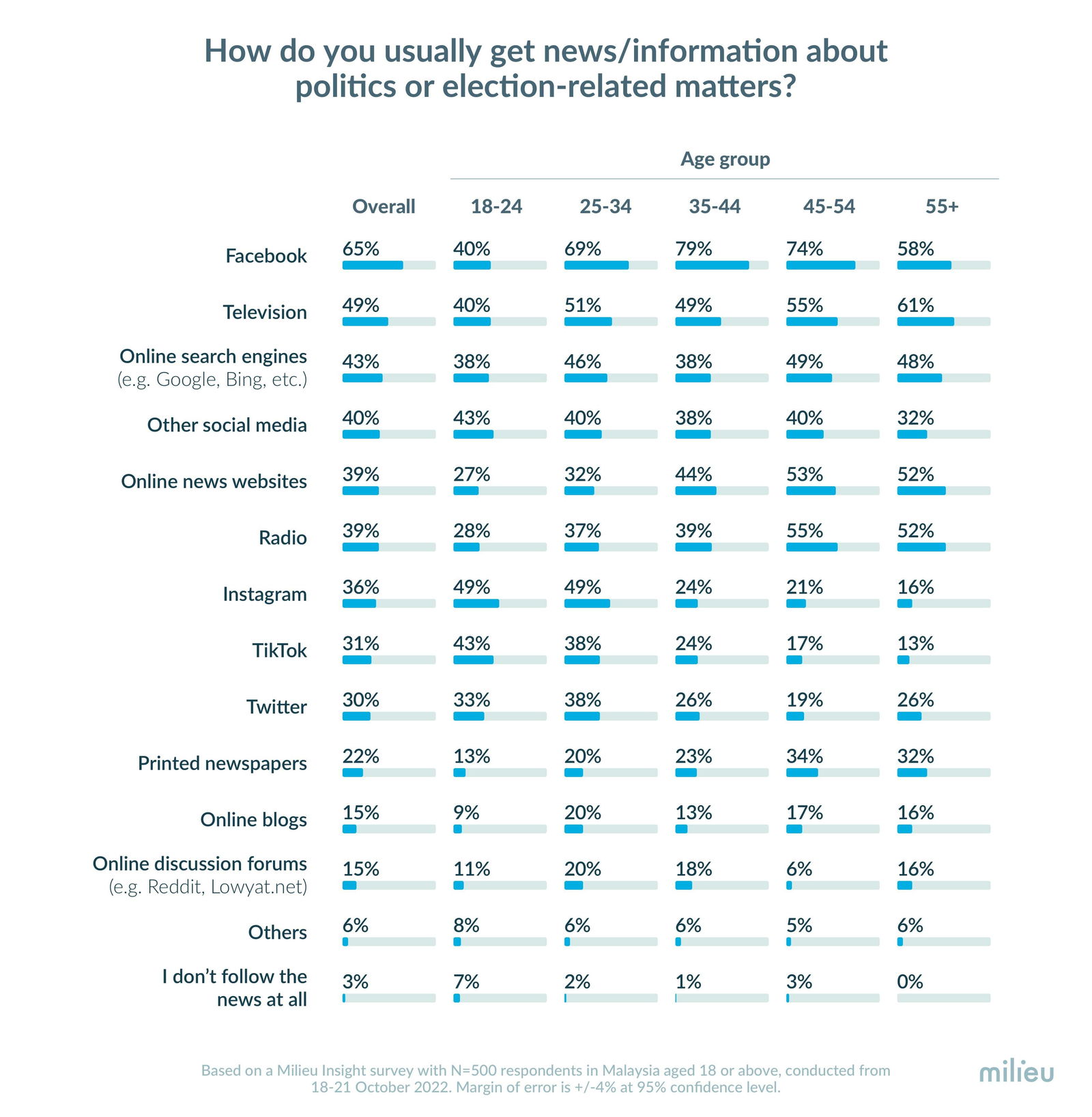
While the dissemination of election news and related matters has expanded from traditional media to social media, blogs, and messaging applications, a recent report by Asia Centre found that political misinformation has also intensified. In fact, misinformation is also widely deployed in the run-up to, during and post-elections. Government agencies, political parties, foreign-based or local PR firms, and content companies are among the actors that initiate, develop and implement disinformation campaigns in Malaysia to influence voter behaviour.
Tech companies, according to the report are responsible for safeguarding consumers against misinformation by monitoring and removing disinformation circulated on their platforms during and in between elections.
In a statement to A+M, tech giant Meta said is allowing political ads on its platform in the lead up to the 15th General Elections and in an effort to be transparent, Meta also wants to let consumers know who is behind the ads to enable them to make informed decisions on Polling Day. As such, advertisers in Malaysia are required to complete an authorisation process and include "Paid for by" disclaimers on these ads. Ads about elections or politics that run in Malaysia will also appear in the Ads Library so that people can see what ads are running, who saw them and how much was spent. This fully searchable archive stores ads for seven years.
Meta's head of politics and government outreach, APAC, Roy Tan, explained that Meta's goal is to "make it harder to interfere with elections" on its platform, and easier for people to make their voices heard in the political process. "We are committed to tackling harmful content on our platform - which we know may intensify during elections - from misinformation, misrepresentation and interference, to hate speech," Tan said.
Its GE15 initiatives cover three aspects - tackling misinformation, civic integrity, and civic engagement. These involve initiatives such as third-party fact-checking in partnership with AFP, enforcement against fake accounts and misrepresentation, using AI to detect violations when it comes to foreign interference and prioritising content for human review, teaching candidates responsible and effective use of Meta's apps to candidates, and directing people to official voting information. Additionally, it also supports news publishers on creating responsible and quality content.
Meet Asia’s top PR and communication leaders in-person. PR Asia sets the stage for the future of purpose-driven contemporary PR. Join us on 9 November as we gather Asia’s top PR and communication practitioners in-person in Malaysia. Deep dive into the next necessary steps for PR as we head towards 2023. Only at #PRAsia.
Which political party has the most share of voice?
A few mainstream political parties are vying for dominance this GE15 - Barisan Nasional, Pakatan Harapan, Perikatan Nasional, and Gerakan Tanah Air. According to Milieu Insight's survey, Pakatan Harapan was selected as the party that most 45 to 54 year olds were familiar with and had some level of understanding as well as who is involved. This was followed by Barisan Nasional (71%) and Perikatan Nasional (53%).
Likewise, those aged 25 to 34 (59%) and 35 to 44 (64%) were most familiar with Pakatan Harapan followed by Barisan Nasional. Gen Z, on the other hand, chose Barsian Nasional as the party they were most familiar with (63%) followed by Pakatan Harapan (57%).
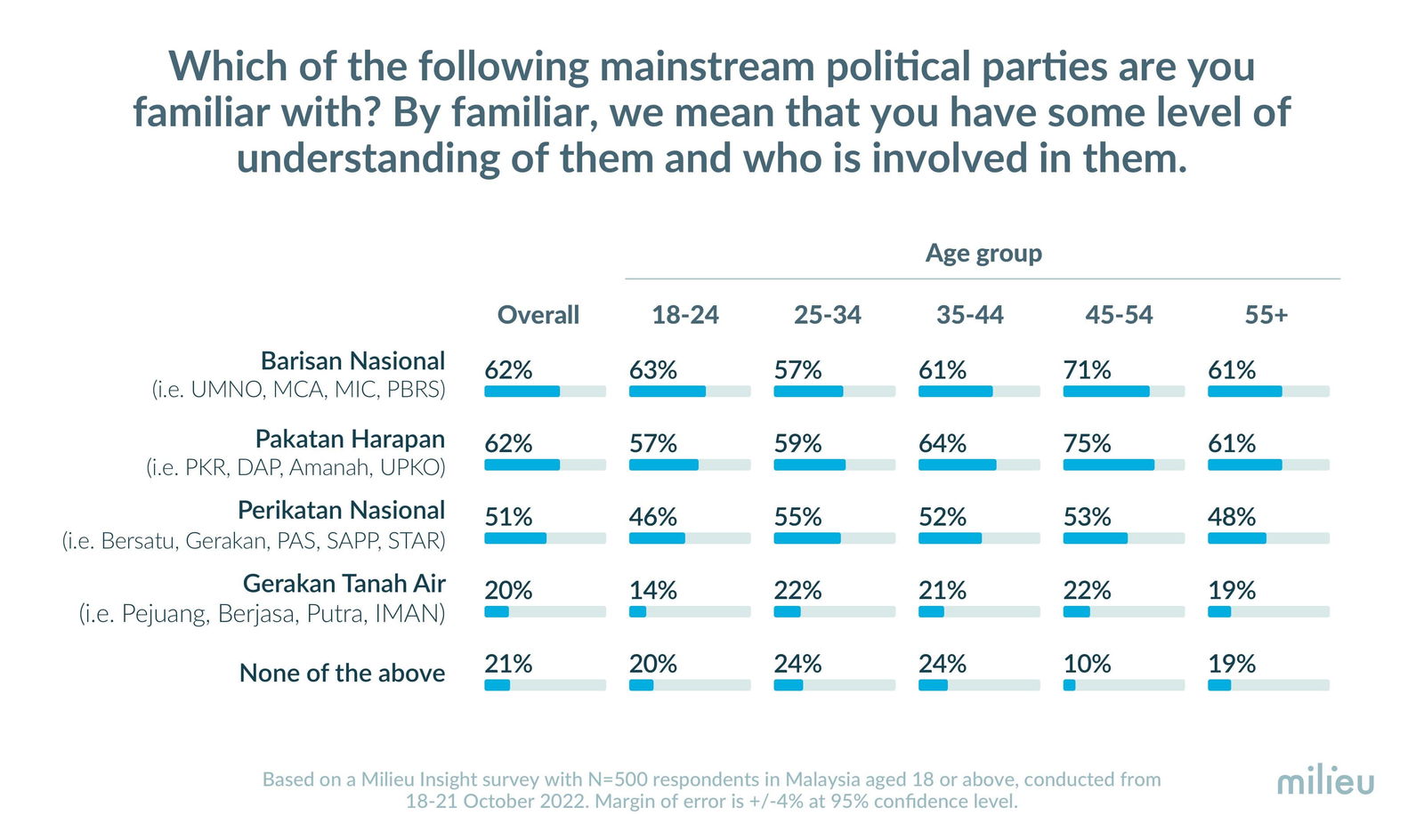
Similarly, statistics by CARMA Asia from 10 to 21 October showed that Barisan Nasional (44.8%) and Pakatan Harapan (30.8%) are the two parties with the largest share of voice. When it comes to politicians, Zahid Hamidi (30.9%) and Ismail Sabri (20.2%) had the majority share of voice, followed by Anwar Ibrahim (19.6%).
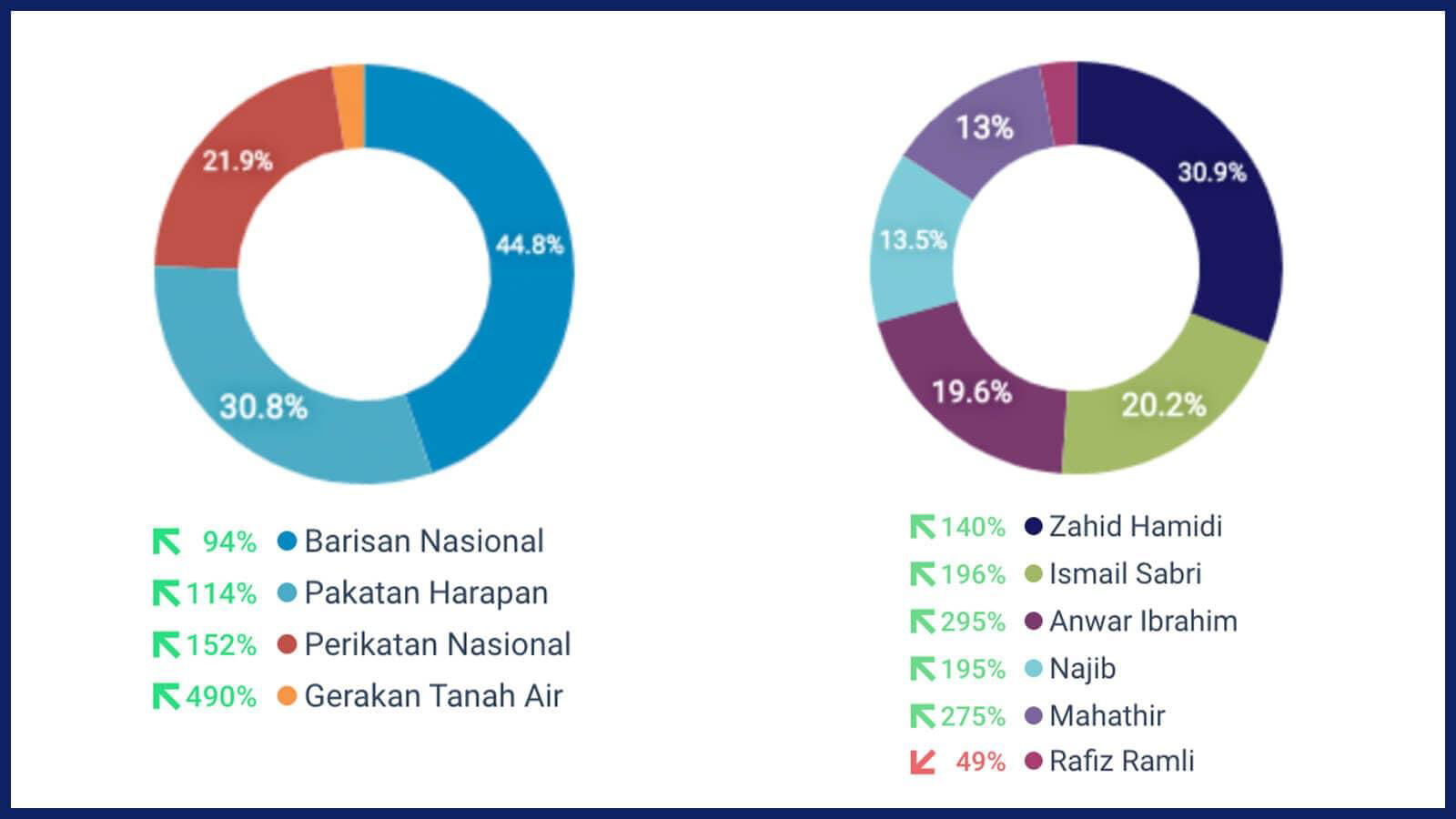
The most negative post surrounding the election, according to CARMA Asia, was Zahid's statement: "Kalau kita tercundang, nasib kita lebih buruk daripada PRU ke-14. Bukan saya saja kena charge, Tok Mat, you are on the waiting list." BFM tweeted it and the post alone garnered 9,707 retweets, 3,500 quote tweets, and 7,969 likes.
https://twitter.com/NewsBFM/status/1579804272577105920
Which brands are trending online?
PETRONAS, Maybank, Instagram, Huawei, Bernama, Facebook, Malaysia Airlines, and LinkedIn were among the top brands mentioned in the GE15 chatter between 26 September to 25 October, CARMA Asia found.
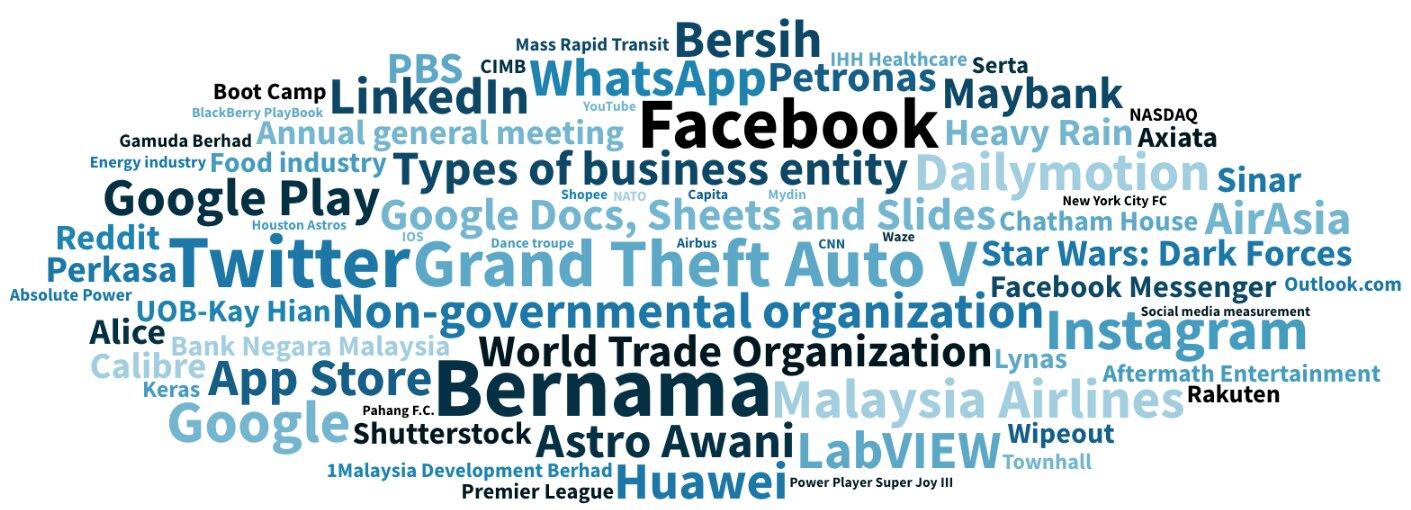
Airline brands AirAsia and Malaysia Airlines drew chatter recently after media outlets reported an exponential spike in airfares following the announcement of polling dates for GE15. Netizens, in particular, were shocked by the increase in airfares. Both AirAsia and Malaysia Airlines witnessed a spike in social conversations on 20 October and 21 October respectively.
According to CARMA Asia, its data showed negative social sentiments surrounding AirAsia from 20 October coinciding with when GE15 dates were announced. While positive sentiment for AirAsia stood at 10.4% from 26 September to 25 October, CARMA Asia said positive sentiment dipped to 5.6% from 20 October to 25 October. Some of the trending keywords for AirAsia included the poop emoji, "AirAsia", "cancel", "booking", and "flight".
Meanwhile, Malaysia Airlines also witnessed negative social sentiments on 21 October which coincided with the airline's campaign for Malaysians to fly home to vote. The national carrier recently launched its “Jom Balik Mengundi” campaign, offering 20% discounted fares to facilitate voter movement via air transport, for travel from 11 to 27 November 2022. It will also mount additional 26 flights and upgrade 16 domestic services to wide-body A330 aircraft to accommodate the surge in demand for several routes in Peninsular Malaysia, Sabah and Sarawak.
Positive sentiment surrounding Malaysia Airlines dipped from 9.1% from 26 September to 25 October to 1.7% from 20 October to 25 October, CARMA Asia found.
What else are Malaysians talking about?
Aside from brands and political parties, other trending keywords and hashtags for the upcoming GE15 include "pilihan raya", "suruhanjaya pilihan", "raya umun", and "pembubaran parlimen".
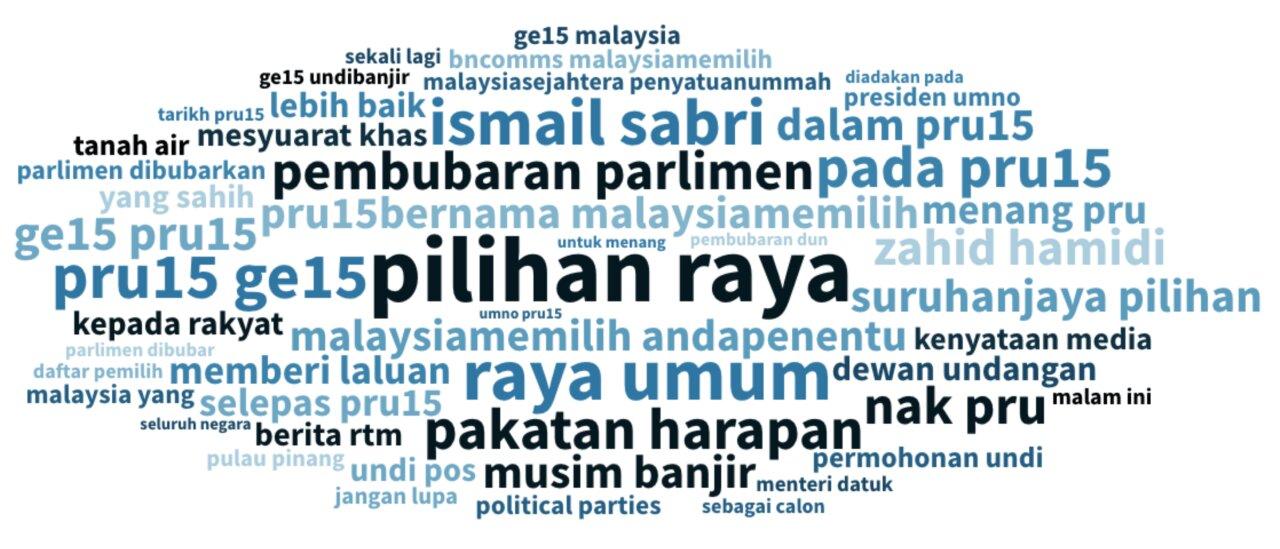
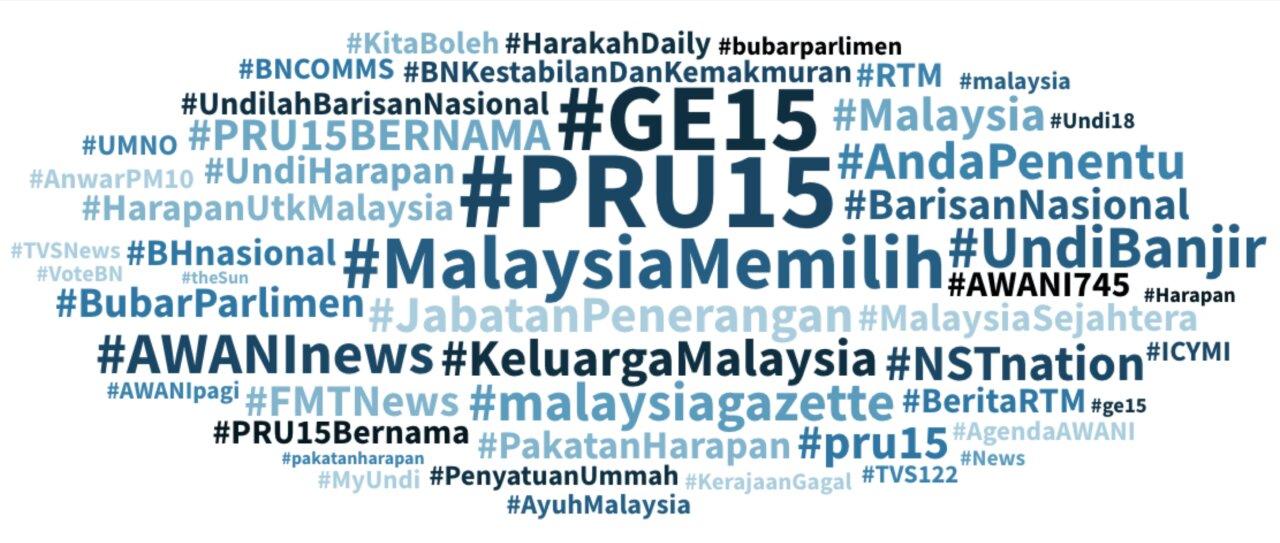
Meet Asia’s top PR and communication leaders in-person. PR Asia sets the stage for the future of purpose-driven contemporary PR. Join us on 9 November as we gather Asia’s top PR and communication practitioners in-person in Malaysia. Deep dive into the next necessary steps for PR as we head towards 2023. Only at #PRAsia.
share on
Free newsletter
Get the daily lowdown on Asia's top marketing stories.
We break down the big and messy topics of the day so you're updated on the most important developments in Asia's marketing development – for free.
subscribe now open in new window
